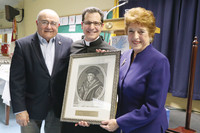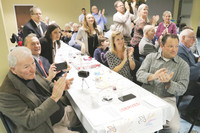

WESTERLY — A longtime pro-life advocate whose ministry began in the Diocese of Providence and led her to the United Nations — and even the Vatican — has been honored for her work in defending human life by Immaculate Conception Church.
Maria Parker, who served as Respect Life coordinator for the diocese from 1992-1998 before advancing her ministry, received the St. Thomas More Defender of the Faith Pro-life Award during the parish’s fifth annual Respect Life Dinner on January 27.
“Maria Parker is very deserving,” Immaculate Conception Pastor Father Giacomo Capoverdi told Rhode Island Catholic of her selection as this year’s recipient of the award.
Father Capoverdi noted that Parker was a visionary in taking an early stance in support of life, even before the Supreme Court decision that legalized abortion in 1973.
“It’s [before the Roe v Wade decision in 1973] when women like Maria Parker realized things were moving in that direction,” he said, of the trajectory anti-life forces were on to make abortion legal.
“She’s a pro-life icon … and her resume certainly speaks for itself regarding the incredible work she’s done in the movement, and continues to do,” Father Capoverdi said.
Proceeds from the parish dinner benefit pro-life efforts at Immaculate Conception Parish, including its Crisis Pregnancy Center, founded by the late Deb Fallacaro, who last year was posthumously awarded the Defender of the Faith honor. The center provides services for women in crisis pregnancies, including diapers, car seats, strollers, clothing, personal assistance as well as an ultrasound van that visits twice a month.
Parker, a parishioner of nearby St. Clare Parish in Misquamicut, is the mother of five and grandmother of nine. She attended the dinner along with her husband Kenneth Parker and several family members.
“I’m really humbled by this,” she said of the occasion of her now joining the ranks of widely recognized pro-life advocates and previous Defender of the Faith awardees Bishop Thomas J. Tobin and Father Philip Bené, a canon lawyer for the Holy See with whom she served in her work at the United Nations.
Parker’s address at the dinner focused on the path her pro-life advocacy followed leading to that point and beyond.
The oldest of six children, Parker said her childhood was a very happy one and provided her with the strong foundation she needed to embark on her 30-year ministry.
“Our family life revolved around our Catholic faith and our Italian heritage,” she said.
During the 1970s and 80s, as if she and Ken didn’t already have their hands full raising their five children, she also directed the Westone preschool, and its staff of eight and 100 students.
“I was pro-life, but not a member of a pro-life group,” she said, noting her shock when the U.S. Supreme Court rendered its decision to legalize abortion.
Later, when she served as president of the Westerly branch of the American University Women, which she had joined in 1990 to work on education matters, she called a meeting of the board — comprised of Protestant, Catholic and Jewish women — to respond to a form letter sent to all branches stamped with the words “Campaign for Choice.”
“Even the pro-choice members were shocked and voted to take a stand against the campaign for choice,” she said. “We sent that response to the national president and copied it to 1,500 branch presidents nationwide.”
That May Parker graduated from URI with an MBA, and her husband surprised her with a trip to Australia as a graduation gift.
When they returned, their dining room table was covered with mail, some disagreeing with the board’s stance, while other letters from some pro-choice branch presidents, opposed to someone being forced to act against their conscience, surprisingly supported their decision.
She met that fall with 12 women in Oregon to plan a strategy from changing the group’s policy from pro-choice to neutral, speaking her mind before an audience of 2,000 women.
With the ensuing vote orchestrated in advance, and her motion defeated, Parker left the hall feeling betrayed. That night, after a national TV news reporter tracked her down on her way out and secured an interview with her, a story appeared on the air which caught the eye of then-Bishop Louis E. Gelineau.
He wanted to meet the woman who had taken on this pro-choice organization and called her to his office at the chancery in Providence.
“A month later, I began my pro-life career as diocesan Respect Life Coordinator feeling this was where God wanted me,” Parker said.
Along with then-Rhode Island Sen. David Carlin, Parker formed the Lifenet legislative action network.
“As a result of the prayers and actions of people in the pews, in three years we changed the Rhode Island legislature from pro-choice to a pro-life majority,” she said.
They also tackled the issue of assisted suicide, prompting a legislative ban on assisted suicide and partial birth abortion, a hard-fought victory in an age when computers and email were not yet in most households.
During a meeting that July of Catholic Conference directors in Washington, D.C., the U.S. bishops applauded the Rhode Island delegation for accomplishing something no other Catholic Conference had ever done — achieve two major pro-life victories in one month.
“It proved to me that we, the people, can make a difference and that our efforts can actually result in saving lives,” she said.
Shortly after that, Bishop Robert E. Mulvee asked her to host a diocesan radio and TV series. After taping a program, one of her guests, the director of the Massachusetts Catholic Conference, told her there was a move to legalize Assisted Suicide there and they needed a project director to educate the state on the issue.
After being asked to apply for the position, she prayed before making a decision.
Confident that the pro-life movement was strong in Rhode Island, she applied and was hired.
After succeeding in stopping Assisted Suicide in Massachusetts, she was promoted to associate director of Public Policy for the Massachusetts Catholic Conference, which encompasses all the four Bay State dioceses of Boston, Worcester, Springfield and Fall River.
Parker’s strong pro-life victories were about to propel her to the international stage.
She was nominated to represent the World Union of Catholic Women’s Organizations at the United Nations.
“With the support of the cardinal, I agreed to the nomination and in 1998 joined the World Board,” she said.
For nine years, she served as the main U.N. representative for World Union of Catholic Women. During that time, at what she recalled as “a beautiful ceremony” in St. Patrick’s Cathedral in New York City, she was invested as a Dame of Malta.
“After one of my board meetings in Rome, it was the thrill of a lifetime to be one of 24 in the world invited to the private Mass of Pope John Paul II at Castel Gandolfo and then to personally meet with him,” she remembers. “I still use the rosaries he gave me and must say it was an experience like no other on earth. I will never forget it.”
While Parker has certainly experienced the thrill of victory in the course of her ministry, she also has felt the agony of defeat in the pro-life arena.
In 2003, the Massachusetts Supreme Court legalized same sex marriage, and charged the legislature with approving the decision and with changing 1,500 state laws on marriage.
Parker and her team of three were charged with educating people on how the sweeping changes in the laws would affect them. They gave it their best effort.
“While we were not able to reverse the marriage decision, the importance of electing people who personify our values was never more evident to me,” she said.
“We’re blessed to have Sam Azzinaro (a fellow Defender of Human Life awardee), as a pro-life representative here but our four congressional leaders and governor are pro-abortion.”
“They know they could not get elected without the Catholic vote, yet they do not represent us. That should tell us that if we, people of faith united, we would succeed in changing the political landscape in this state…and that would be refreshing.”
In 2003, after Parker monitored one of the U.N. sessions of the third committee for the Holy See Mission, Archbishop Migliore, the Vatican nuncio asked her to moderate a panel for the Holy See in the fall. The program would be on Pope John 23rd’s encyclical, Pacem in Terris or Peace on Earth.
In the spring of 2011, the Holy See Mission in New York invited her to serve as an official member of their delegation to the Commission on the Status of Women.
“It is a difficult U.N. meeting when thousands of radical feminists from around the world converge on the U.N. to force their pro-abortion agenda there,” Parker said.
“At one point, Father Bené invited me to read the Holy See statement on the floor of the U.N. to a packed room. It was a thrill for me to read the Holy See statement before the Commission on the Status of Women,” she recalled. “With God’s help, we were able to defeat them that year.”
Parker said that in looking back over the past 30 years of her pro-life ministry there is one common thread linking each experience to the next.
“It became so clear to me that people, circumstances and events placed in my path were not mere coincidences but the hand of God at work,” she said.
“God invites each of us to build a society that values every human life. We all know that without the right to life, all other rights are meaningless.”
Nuala McLaughlin, chair of Immaculate Conception Parish’s Respect Life Committee, praised Parker’s dedication to the pro-life cause and her ability to inspire others to take action in support of it.
“She’s a very strong person and a good role model, she’s just great,” McLaughlin said.
“We’re hoping that Maria is really going to inspire our guests to go back to their churches and give a couple of hours of their time to their life committees,” she added.
“We have great ideas, but we don’t have the people to carry them out.”